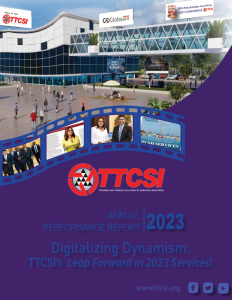Factors Affecting the Ease of Doing Business in T&T for the Services Sector.
by Rabindra Jaggernauth , President
25/05/12
As an ICT and Management consultant, I tend to focus on the opportunities that technology presents to small and medium-sized enterprises. I am passionate about the development of the services sector in large part because I’ve seen technology’s transformative power at work in other societies. That said, I think business owners need to be mindful of the larger ICT framework within which we operate. Technology brings as many responsibilities to the table as it does advantages, and we each have a part to play in the development of a productive business environment. Today I want to discuss several of the factors that affect the ease with which we do business in Trinidad & Tobago.
The importance of small businesses to this country’s sustainability cannot be emphasized enough, particularly amidst current efforts to diversify the economy. The management of information and information services has become as important an economic activity in some countries as the production of tangible goods. Following this model, we realise how integral the services sector, and the many small and medium-sized enterprises within it, are to productivity in T&T.
As a major advocate of the vital role the services sector can play in increasing investment and diversifying this economy’s production base, the TTCSI needs to be at the forefront of this campaign. One of our most compelling projects has been the application of ICT to the development of one of this society’s most creative and integral crafts: the Carnival Masquerade industry. We’ve worked with dozens of bands, blending traditional skills with modern innovation to revitalise the sector’s identity. But that effort simply scratches the surface of what we need to accomplish.
During our National Services Week last year, Science and Technology Minister Fazal Karim called on SMEs in the services industry to compete ahead of the curve, and to dramatically improve their approach to conducting business. The Minister called on us to be game changers. I want to renew that call. However, I also want to remind the government of its own duty in nurturing the playing field on which the game is played.
The 2012 World Bank Doing Business report makes it clear that policy makers are responsible for creating a regulatory environment conducive to the creation and growth of business, and the promotion of competition. To its credit, this government has been vocal in its promotion of the use of ICT to increase productivity and cost efficiency in SMEs. The passing of the Electronic Transactions Act and promised upgrades to the nation’s broadband network are significant steps in the right direction.
Between 2011 and 2012, T&T moved up eight places to rank 68th on the Ease of Doing Business listing, which is heartening at first glance. At the top of the list, however, sits Singapore, a country with no natural resources to speak of. Singapore has built its economy into one of the strongest in the world in large part by embracing ICT as a cornerstone of its diverse and progressive service sectors. In that light, our energy-rich country, which relies so much on service industries, has no excuse for such a mediocre ranking. As a sector, we need to move past rudimentary application of ICT and, like Singapore, accept technology as a backbone of our economy. And the Government now needs to accelerate this upward trend by implementing measures that have been on the backburner for too long now.
Chief among these measures are the updating of the Exchequers and Audit Act and the full launch of the TTBizLink platform. TTBizLink will take registration, document submission, government payments and other mundane tasks online, and increase the pace of business to a level it should have reached years ago. The Single Electronic Window will remove entrepreneurs from long waits in long lines, and should eliminate run-around between government buildings. It will serve as yet another example of how ICT levels the playing field for SMEs. Larger organisations have always had the capacity and resources to fulfil these time-consuming processes. However, the often-overwhelming requirements have always been a disincentive to smaller businesses, and can sometimes even mean the difference between success and failure. The TTBizLink platform should lessen some of that disparity. The Government should maintain that momentum and consider the specific needs of smaller businesses and entrepreneurs. True modernisation calls for the revision of some of the more archaic, colonially-inherited processes that will continue to plague business owners even after the adoption of the new online platform.
Modernisation also calls for a change in attitude, and here is where I want to address members of the private sector. Many of us have taken what I’ll carefully refer to as “shortcuts”. The complexity and costs of the inefficient old systems have made it easy for us to justify “special” ways of dealing with regulations and bureaucracy. The adoption of new measures represents an opportunity to retire these old methods and fulfil our responsibilities as entrepreneurs. A modern framework necessitates mature thinking, and we must use these convenient information tools to actually share all the information we’re required to provide, instead of hiding it. Without proper private sector statistics, it will be impossible for the Government to ensure that their development plans are addressing the right areas. The local banking sector is now a block to the greater adoption of E-Commerce in Trinidad and Tobago. While it is not a perfect world in terms of the legislation and regulations, provision of facilities for online payment of goods and services should be a priority. We need to move beyond the talk and start doing thereby making it easy for businesses especially in the services sector to do business and moreso to allow innovation to happen.
I want to conclude by encouraging each of you to think deeply about how these developments will affect the way you do business. To make the most of the advancements that lie ahead, we need to adopt a shared vision and work consistently towards a shared goal. We need to embrace our responsibilities and adapt the way we think to match this new status quo.




